Race to a clean, green and sustainable future
Initiatives and projects undertaken by the UAE as part of its Net Zero by 2050 initiative to achieve net-zero emissions, also offer a rich template to nations of the world on achieving their respective net zero targets
The official portal of the UAE Government succinctly describes the vision and mission of the nation’s UAE Net Zero by 2050 initiative. A national drive to achieve net-zero emissions by 2050, the UAE Net Zero by 2050 initiative will also make the UAE the first Middle East and North Africa (MENA) nation to achieve such a goal.
The initiative aligns with the UAE’s roadmap for accelerating national economic development to mark the country’s golden jubilee year as the nation launches into a new 50-year growth cycle. Called Principles of the 50, the major economic opportunities offered by the path to net zero directly support a vision to develop the UAE into the world’s most dynamic economy.
GLOBAL ALIGNMENT
The UAE Net Zero 2050 strategic initiative also directly aligns with the Paris Agreement, which calls on countries to prepare long-term strategies to reduce greenhouse gas (GHG) emissions. It also looks at limiting
the rise in global temperature to 1.5°C compared to pre-industrial levels.
However, while the Paris Agreement attempts to uphold its vision to ensure global temperatures stay within 2°C by 2100, and preferably closer to 1.5°C, the UN Emissions Gap Report 2020 presents a more dire
picture. The report forecasts that “...despite a brief dip in carbon dioxide emissions caused by the Covid-19 pandemic, the world is still heading for a temperature rise in excess of 3°C this century – far beyond the Paris Agreement goals of limiting global warming to well below 2°C and pursuing 1.5°C.”
Shutterstock
Be that as it may, the grim realities only made the nations of the world more resolute in coming together and cohesively trying to find a solution to the issue. By 2020 more than 110 countries had in fact committed to a net zero emissions target by 2050, and China, the largest emitter, by 2060. Carbon neutrality
means some emissions are still being generated but will be offset somewhere else, concluding in net zero emissions. Closer to home, the UAE Ministry of Climate Change and Environment (MOCCAE) has taken the lead to coordinate efforts and execute the UAE Net Zero by 2050 strategic initiative, ensuring collaboration at a national level to fulfil this objective.
UAE INITIATIVES
Stakeholders in key sectors in the UAE such as energy, economy, industry, infrastructure, transport, waste, agriculture, and the environment, will update relevant plans, strategies, and policies, and implement initiatives and projects to achieve net zero by 2050 in line with their needs and growth requirements.
Both federal and local government authorities will also be responsible for preparing comprehensive studies and developing plans to introduce measures necessary to reduce emissions while also ensuring economic growth based on sustainability principles.
For instance, the deployment and use of clean energy solutions is one of the main pillars of the UAE’s model of addressing the challenge of climate change and reducing GHG emissions. The UAE began financing clean energy projects more than 15 years ago, and has invested more than $40 billion in the sector. Current trends predict the production capacity of clean energy, including solar and nuclear, to reach 14GW by 2030, up from about 100MW in 2015 and 2.4GW in 2020.
NEED OF THE HOUR
Energy innovations over the past two decades have offered a

Abu Dhabi Sustainability Week 2023 to set agenda for inclusive climate action

Under the theme, United on Climate Action Towards COP28, ADSW 2023 will demonstrate the commitment to practical, inclusive climate action by the UAE leadership
Abu Dhabi Sustainability Week (ADSW) 2023, the global initiative championed by the UAE and its clean energy powerhouse, Masdar to accelerate sustainable development, will feature a series of high-level sessions focused on the key priorities for sustainable development ahead of the United Nations Climate Change Conference (COP28), to be held in the UAE from November 30 to December 12.
The event is being held under the patronage of the UAE President His Highness Shaikh Mohammad Bin Zayed Al Nahyan who has championed sustainability as a key pillar of the UAE’s economic and social progress and prosperity.
ADSW, which started on January 14 and runs till January 19, under the theme of United on Climate Action Towards COP28, convenes heads of state, policymakers, industry leaders, investors, youth, and entrepreneurs, for a series of impactful dialogues on the transition to a net-zero future. Key stakeholders will discuss priorities for the global climate agenda at COP28, the need for all stakeholders across society to be engaged and included, and how to leverage the assessments from the first
Global Stocktake of the Paris Agreement to accelerate climate progress at COP28 and beyond.
Dr Sultan Ahmad Al Jaber, UAE Minister of Industry and Advanced Technology, Managing Director and Group CEO of Adnoc, and Chairman of Masdar, says, “For over 15 years, ADSW has reinforced the UAE’s commitment to addressing global challenges as a responsible leader driving climate action and sustainable economic development. ADSW 2023 will help shape the sustainability agenda and drive momentum toward COP28 in the UAE by convening the global community and facilitating meaningful dialogue to foster consensus, groundbreaking partnerships and innovative solutions.
“The world needs a just and inclusive energy transition that supports the needs of developing nations while ensuring a more sustainable future for us all.
“ADSW can serve as an ideal platform to accelerate the adoption of clean technologies and put partnerships together that can take them to scale around the world, leaving no one behind.”
ADSW 2023 will feature for the first time a Green Hydrogen Summit, hosted
by Masdar’s green hydrogen business, highlighting its potential to decarbonise key industries — helping countries to achieve their net-zero objectives.
Last year, Masdar formally announced a new shareholding structure and the launch of its green hydrogen business — forming a clean energy powerhouse that will spearhead global decarbonisation efforts.
Masdar is now one of the largest clean energy companies of its kind and is well-positioned to lead the industry on a global scale, strengthening the UAE’s role as an energy leader.
window of opportunity for nations and their citizens to preserve the world, offsetting the harm that could be done by continuing to use fossil fuels, which according to a study conducted by National Geographic supplies 80 per cent of the world’s energy. Therefore understanding one’s carbon footprints allows each and every individual to help in start reducing emissions. Monitoring one’s carbon dioxide emissions in real-time and accurately offsetting remaining emissions is key.
Given that an increasing number of nations have committed to net zero targets, it’s anticipated that demand for carbon accounting software will grow exponentially. Carbon management software provides companies with the ability to monitor their emissions, helps with reducing emissions in real-time and offers to offset remaining emissions. Such tools are essential for businesses to fight climate change.
UAE: UNITING THE WORLD
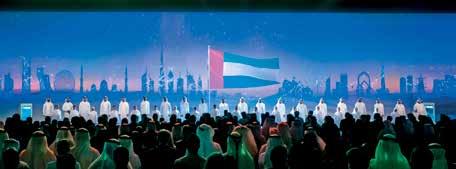
For the UAE, the mission to net zero is not limited to its own geographical boundaries, it encompasses the world. The UAE supports green infrastructure and clean energy projects worldwide, and has invested in renewable energy ventures worth around $16.8 billion in 70 countries with a focus on developing nations. It has also provided more than $400 million in aid and soft loans for clean energy projects globally. The initiatives, while providing support also offer a template to other nations on how reaching out and supporting each other could help achieve a common goal that is beneficial to the world.
feature the annual forum for Masdar’s Women in Sustainability, Environment and Renewable Energy (WiSER) platform, giving women a greater voice in the sustainability debate.
As in previous years, ADSW 2023 also features partner-led events and opportunities for international engagement on sustainability-related topics, including the International Renewable Energy Agency’s IRENA Assembly, the Atlantic Council Energy Forum, the Abu Dhabi Sustainable Finance Forum, and the World Future Energy Summit.
The 2023 ADSW also marks the 15th anniversary of the Zayed Sustainability Prize — the UAE’s pioneering global award for recognising excellence in sustainability.
With 96 winners across its categories of Health, Food, Energy, Water, and Global High Schools, the Prize has positively impacted the lives of over 378 million people around the world, including in Vietnam, Nepal, Sudan, Ethiopia, Maldives and Tuvalu.
Over the years, the prize has provided communities across the world with access to quality education, clean food and water, quality healthcare, energy, jobs, and improved community safety.
The first international sustainability gathering of the year, ADSW 2023 drives discussion and debate around climate action in the run-up to COP28. The ADSW Summit, hosted by Masdar and taking place on January 16-17, will focus on a range of critical topics including Food and Water Security, Energy Access, Industrial Decarbonisation, Health, and Climate Adaptation.
ADSW 2023 also seeks to engage youth in climate action, with its Youth for Sustainability platform holding the Y4S Hub, which aims to attract 3,000 young people. ADSW 2023 will also
With small and medium-sized enterprises (SMEs) making up roughly 90 per cent of businesses worldwide, ADSW 2023 will welcome over 70 SMEs and start-ups across several sectors, including Masdar City’s global initiative Innovate, which will showcase groundbreaking international technologies.
To learn more about Abu Dhabi Sustainability Week and to register visit https://abudhabisustainabilityweek.com/
Key dates for ADSW 2023
• January 14–15 IRENA Assembly, Atlantic Council Energy Forum
• January 16 Opening Ceremony, COP28 Strategy Announcement and Zayed Sustainability Prize Awards Ceremony, ADSW Summit
• January 16–18 World Future Energy Summit, Youth 4 Sustainability Hub, Innovate January 17 WiSER Forum
• January 18 Green Hydrogen Summit and Abu Dhabi Sustainable Finance Forum
Participants and the audience seen at a previous edition of Abu Dhabi Sustainability Week
UAE
NET ZERO BY 2050
A Gulf News Sponsored Report in collaboration with Red Door Productions Monday, January 16, 2023
Beko ranks again among top brands
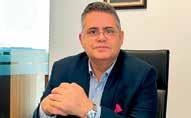
European home appliance brand ranks high in Real Leaders Top 300 Impact Companies of 2023
It’s a proud moment for Beko’s sustainability journey! Beko, one of Europe’s top three large home appliance brands*, has been ranked 17th on the Top 300 Impact Companies of 2023 list that recognises organisations making a positive social or environmental impact. Oral Bozkurt, General Manager and Regional Director, Beko Gulf FZE, says, “Beko, the global brand of Arçelik, and a global manufacturer that engages in the production and marketing of durable goods and consumer electronics embarked on a journey to make a difference with a holistic sustainability approach we call In Touch Technology. By making sustainability a business model and integrating it into everything we do, Beko strives to reduce human environmental damage through developing high-performance, durable, affordable home appliances that are also eco-friendly.”

In line with its sustainability vision, healthy living is only possible on a healthy planet, Beko focuses on empowering generations to live healthier lives, knowing that this is only possible on a healthy planet with a more sustainable existence.

Sustainable practices are deeply woven through Beko’s DNA. In 2022 its parent company, Arçelik, was recognised by the World Economic Forum (WEF), and its Ulmi plant in Romania awarded Sustainability Lighthouse status for its implementation and use of cutting-edge technology to enhance energy and water efficiency. This achievement makes it one of ten Sustainability Lighthouse sites in the Global Lighthouse Network and demonstrates the company’s leadership in efficient and sustainable manufacturing.
“We hear our consumers and


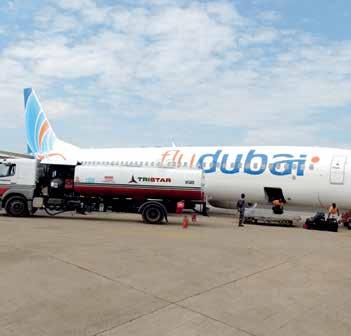

strive to be a positive force for change in line with the shift in consumer demand. At Beko, we have been focusing on environmentally friendly living for a number of years, raising awareness and democratising technology that makes eco-living possible, affordable, and convenient,” Bozkurt adds.
“Through our strategic investments in green energy, energy efficiency and green financing, we aim to achieve our robust emission reduction targets and align ourselves with the Paris Agreement’s 1.5°C goal,” Bozkurt emphasises. “Our company’s 2030 targets fit into the principles of sustainable growth and value creation and are aligned with the United Nations Sustainable Development Goals (SDGs).”
“In line with the near zero-waste concept, we aim to increase the waste recycling rate in manufacturing to 99 per cent in global operations by 2030. Thanks to these practices endorsing circular economy, we reduce waste generation and the amount of waste regularly sent to landfills or for incineration, excluding those sent for energy recovery’, Bozkurt concludes.
*Source Euromonitor International Limited; Large Appliances as per “Major Appliances” in Consumer Appliances 2022ed, retail volume, 2021 data
2 UAE NET ZERO BY 2050 Monday, January 16, 2023
Oral Bozkurt, General Manager, Beko Gulf FZE
Our global presence in 29 countries across Middle East, Africa, Asia, Europe, the Pacific and the Americas, ensures uninterrupted supply round the clock, around the world.
EMICOOL signs agreement to increase solar capacity by 238%

Company is maximising efforts towards inculcating more renewable energy practices in its operations to support the government’s wider sustainable agenda
Emirates District Cooling Company (EMICOOL), a joint venture between Dubai Investments, a leading investment company listed on the Dubai Financial Market (DFM) and Actis LLC, a leading global investor in sustainable infrastructure, has signed a Solar Photovoltaic System Leasing and
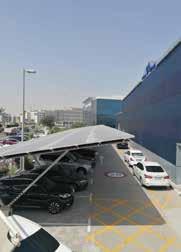

Operation Agreement with Emirates Electrical Engineering (EEE), one of the solar market leaders in the UAE. The agreement confirms the company is increasing its solar capacity by 238 per cent within its District Cooling Plant 1 (DCP1) along with its head office boundaries, located in Dubai Investments Park 1.

The agreement aligns with EMICOOL’s strategic objectives towards maximising the penetration of clean and renewable energy to their processes and

Strengthening the Net Zero vision for customers

supports energy transition into low carbon emissions, and increasing the overall solar penetration to portfolio. With the latest solar facade transformation project, EMICOOL aims to reach 350 KWP (Solar Productive Capacity) for the DCP1 plant. Dr Adib Moubadder, Chief Executive Officer at EMICOOL,
reach net-zero and this partnership will greatly impact our business by maximising and reshaping already existing objectives to improve green energy penetration and contribute to enhancing the quality of life.”
EMICOOL operates in a wellinvested business model that has grown to a platform of 18 operational DC (District Cooling) plants, having a total cooling capacity of more than 330,000 TR.
The Net-Zero dream is big yet often wounded by loose commitments. However, with more and more entities realising the importance of being responsible, ambitious Net Zero charters that are fortified by technology are being put forward, especially in the water industry.
At Xylem, our vision is to solve water issues and help utilities make giant leaps in their Net Zero ambitions.

As a company, sustainability is at the core of everything we do — which is intertwined with our external workings and guides our internal aspirations to Net Zero before 2050. Our goals are mapped out into three main pillars: Customers, the company and communities and touch upon critical areas across our value chain: Decarbonisation, watershed resiliency and stewardship, and equity.
So far, we have made steady progress. We are decarbonising the water sector and reducing greenhouse gases released across both our customer value chains. In tandem, we are empowering communities by aligning philanthropic partnerships that focus on decarbonisation, including nature-based climate solutions.
When it comes to stewardship, Xylem is providing innovative solutions to address water challenges already threatening the health of watersheds around the world and generating huge water, energy and cost savings.
Speaking of equity, we strive for all people to have equitable access to water and sanitation services and to have a voice in the design and management of those services.
Additionally, we have created an organisation that is centred on diverse representation and inclusivity.
To this end, we are committing 1 per cent of our profits every year and 1 per cent of our employees’ time towards contributing to sustainability. Winning the race to Net Zero goes beyond environmental successes, and as a fraternity, we have a real opportunity to break from the status quo, creating smarter utilities and a healthier planet.
says, “As an important economic player within the UAE, Emicool is pursuing efforts to support and enhance the nation’s national strategies like the Dubai Integrated Energy Strategy 2030, as well as the UAE’s 2050 Strategy, contributing to the company’s wider sustainability agenda. We are always focused on integrating the latest technology to
The company has a proven track record in supplying cooling services with thousands of satisfied customers located in several areas. EMICOOL provides district cooling services to DIP, Dubai Motor City, Dubai Sports City, Uptown Mirdif, Palazzo Versace, Damac Hills and Mirdiff Hills, Night Souk by Nakheel, RTA Metro Stations (Expo line), and DWTC at the Expo 2020 site.
3 UAE NET ZERO BY 2050 Monday, January 16,
2023
Top: Electric cars at EMICOOL headquarters; Above and left: Solar panels installed by EMICOOL
Representatives of EMICOOL and Emirates Electrical Engineering at the signing
At Xylem the vision involves helping utilities make giant leaps in their Net Zero ambitions
UAE Net Zero target will be achieved before 2050: UAE Banks Federation
Promoting green projects and practices among customers, SMEs, suppliers and vendors to be part of the group’s activities
By Suneeti Ahuja-Kohli
The vision for the UAE leadership to achieve net zero carbon emissions by 2050 will require a shift. However, like all other initiatives that have been announced and accomplished by our leadership, this goal too will be achieved well before 2050, says Jamal Saleh, Director General of UAE Banks Federation.
“Currently, green finance is still in the early stages in the UAE. There are a few green sukuks, and just a handful of banks who are involved in this space on a voluntary basis,” says Saleh, adding, “However, I see this scaling up considerably; similar to the growth that we have seen in Islamic banking.

“We now have seven fully fledged Islamic banks in the UAE, four of which are featured among the top 20 global banks in terms of asset size. And, the UAE has established the first Islamic bank globally. Hence, I see the same replication, with green financing taking off well in the UAE.”
Talking about the role of the

banking industry in helping the UAE achieve net zero emissions, Saleh says, “There are three main channels through which our UBF member banks will be helping the economy achieve net zero emission targets. First, by fostering and promoting green projects. Second, promoting green practices among individual customers, SMEs, suppliers, and vendors.
And, last, by measuring and efficiently managing every member bank’s own carbon footprint.” Banks are stewards of economic transformation. And, our banking industry can play a seminal role in tapping significant opportunities in the UAE, in particular, and the region, in general.
There is a growing interest in projects with a strong Environmental, Social, and Governance (ESG) angle. In the first half of 2021, green financing linked to sustainability projects in the Middle East and North Africa (MENA) reached $6.4 billion, exceeding the amount raised through the whole of the year before, according to Bloomberg’s H1-2021 Capital Markets League Table.

Shoring up support at the international level, the United Nations has convened a Net-Zero Banking
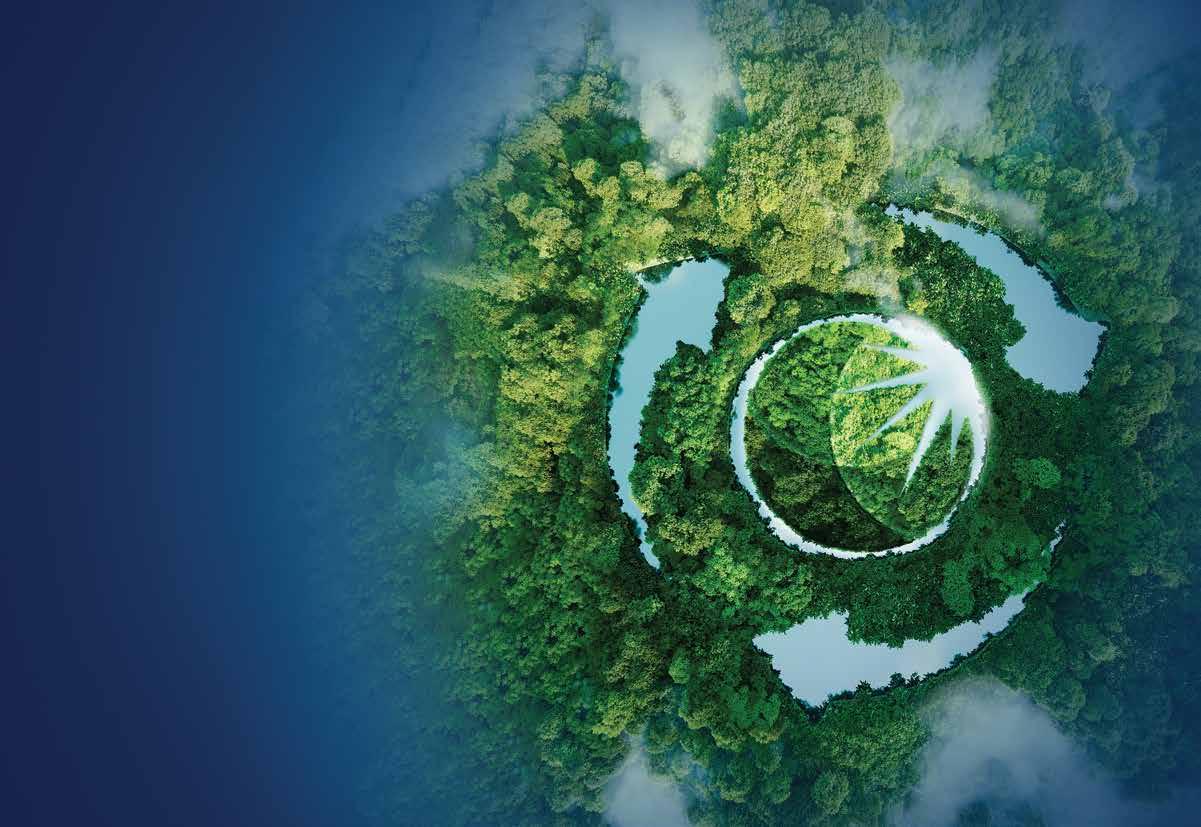
4 Monday, January 16, 2023 UAE NET ZERO BY 2050 - focus on banking
Shutterstock
Alliance that brings together a global group of banks. The group currently represents over 40 per cent of global banking assets, and are committed to aligning their lending and investment portfolios with net zero emissions by 2050. In the UAE, some UBF members have joined this UN-led alliance.
On the local level, UBF is creating a similar alliance with 10 of its largest member banks. “We have built a top-notch steering committee comprising subject matter experts, to drive our ESG endeavours, and a subpart of it will be targeting the environment and carbon footprint,” says Saleh.
The starting point of this alliance will be measuring the footprint of each member bank and drawing plans on how UBF will help its member institutions reduce the carbon footprint.
Saleh says, “We plan to publish positive achievements for our member banks in the course of time. For now, there are three or four banks who are already publishing details on their carbon emissions and footprint in their annual reports, and in due course we expect this to become common for our UBF members.
By the way, this is how corporate governance was introduced in the UAE. Initially, only a few of our UBF members volunteered and introduced a section on corporate governance in their annual reports, but eventually it has become a norm for all.”
Banks finance carbon-emitting businesses as well as projects that are linked to the decarbonisation of the economy. How effectively the industry addresses financed emissions can make a significant difference.
Saleh is highly optimistic that the UAE banking industry and UBF members would soon set a benchmark for the region and play seminal roles in helping the UAE economy achieve its net zero targets. “Once regulations are introduced, every UBF
member will have a window to set their own targets, which will be done in consultation between members and UBF, of course under the oversight, directives and guidance from our regulator, the Central Bank of the UAE.
“UBF members will need to have plans on how they are going to manage the carbon footprint, and when.”
Much like credit risk scores, green finance is expected to introduce a sort of covenant for
customers and eventually will have a score for carbon footprint, notes Saleh.
“Customers will be expected to reduce and manage their carbon footprint over a time period.”
According to PWC, green investments in six key GCC industries could have a profound impact by 2030, unlocking up to US$2 trillion in cumulative GDP contribution, creating more than one million jobs, and encouraging more foreign direct investment (FDI).
The upcoming COP28 meeting in the UAE, which is planned for this year, could also prove to be a pivotal moment for the banking industry in the UAE. Saleh expects a few initiatives that will pave way for green finance and set a timeline for achieving goals of net zero emissions.
“We have come a very long way in the past few years with our regulators, where everything is done hand in hand with clear regulators’ guidance and oversight. We are consulting with all our partners — our primary partner being the Central Bank of the UAE, as well as the Ministry of Finance, Ministry of Economy, Ministry of Commerce, Ministry of Justice, and many others. And, I cannot see a better opportunity for us to drive transformation in a fast way than COP28.”
The challenge for banks in the UAE, however, will be the extent of diversification within the country, and hence the scope of projects that qualify for green financing.
“There is a shift that has to happen in the UAE, says Saleh. “It will happen through awareness extended by the banking industry in educating its customers, and through the oversight and regulation by our Central Bank of the UAE. We know that they have done amazingly well on tough mandates before, and I am most confident that they will do as well on this front too.”
Leading the way in sustainability: ADIB’s commitment to a sustainable future
Leading UAE bank marches ahead with its robust strategy to ensure its contribution to the growth of the UAE banking sector is sustainable for the environment, society, and business
The banking industry plays a crucial role in promoting sustainable growth and development in any economy, and this is particularly true in the UAE, where the government and regulators have been placing a strong emphasis on promoting sustainable practices in the banking sector and encouraging banks to adopt Environmental, social, and governance (ESG) frameworks. As banks look ahead and set the course for future growth and economic development, the impact that industry can have on strengthening communities and spearheading sustainable transformation cannot be overlooked. As a leading Islamic bank, we have embedded our commitment to a sustainable future into the 5-year plan
for Abu Dhabi Islamic Bank (ADIB).

Strong financial results in Q3 that recorded one of the highest quarterly net profits of AED 1 billion equip ADIB to lead the development of sustainability-linked financing solutions.
The bank has a clear ESG framework and is dedicated to increasing green finance and helping stakeholders transition to a low carbon economy. Financial empowerment of the younger generation is another key focus of ADIB supporting the emerging needs of youth and UAE nationals. “Amwali”, the world’s first Islamic digital banking account for youth is focused on empowering them to make informed financial decisions and providing tailored banking services.
This banking solution, like many others launched by ADIB, have been developed to meet the customers’ needs, as well as the UAE’s continuous efforts to encourage progress and growth within the banking sector. It is only with such outstanding support from the country’s regulators that ADIB has constantly been contributing to global sustainable efforts.
We seek to further contribute to the UAE’s green agenda by providing new green finance solutions for our key stakeholders. As we look ahead, we are confident that with the support of UBF, the USE Central Bank and the UAE leaders the banking sector is equipped to ensure a future of inclusion, sustainability, and prosperity for Abu Dhabi and the UAE.
Mandatory ESG disclosure will help accelerate green transition: FAB
As of now, only listed companies must publish this information in annual reports. Private firms do it on a voluntary basis
By Suneeti
Every organisation has a responsibility to address climate change and environmental, social and governance (ESG) disclosures must be a key part of this exercise, says Shargiil Bashir, Chief Sustainability Officer at First Abu Dhabi Bank (FAB).
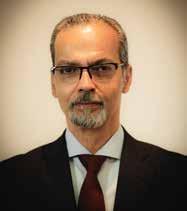

“We need a standard set of disclosure requirements on ESG for all companies. As of now, only listed companies must mandatorily publish this information while private firms do so on a voluntary basis. ESG disclosure practices and guidelines for all companies would align this information in much the same way as
how financial statements work.”
Such standards would enable better transparency and greater understanding of the internal workings of companies, meaning banks could apply better judgement when lending to green projects. “This process serves to uncover opportunities as well as gaps for companies to work more effectively.”
The banking industry has always been instrumental in pushing through change and transformation in economies. “Banks are a touchpoint in society as they engage with broad stakeholder groups such as governments, public and private sectors, and consumers all across diverse industries and segments. Banks have the responsibility and, in many ways, the capabilities to help companies to turn their net zero commitments into action,” adds Bashir.
As per Bloomberg’s Capital Markets League Tables, green and sustainable bond and sukuk issuances in the GCC reached a record $8.5 billion from 15 deals in 2022. This is a significant increase from $605 million from six deals in 2021. First Abu Dhabi Bank remained one of the region’s leaders in 2022 with three green bond issuances accounting for approximately $1.49 billion during the period.
“At FAB, we want to support the UAE’s ambition to achieve the Net Zero 2050 Strategic Initiative and also enable our clients and employees to be more conscious and environmentally responsible. We were the first bank in the

GCC to join the UN-led Net Zero Banking Alliance, and also the first to issue a green bond of $587 million in the region in 2017,” says Bashir. Since 2017, the bank has issued 14 more green bonds.
“The bond issued in 2017 worked on 13 different projects. About 63 per cent of the funds supported projects that focused on energy efficiency; 30 per cent was invested for renewable energy, and the remaining 6 per cent was for wastewater management projects. Some of the solar
includes sustainable financing, green bonds, governance, awareness raising, etc. And we’re eager to build on the work we’ve done so far. In 2022, we issued green bonds of more than a billion. I foresee that green bonds will be an important financial instrument in the future as well,” says Bashir.
projects supported through this bond avoided carbon emission of close to two million tonnes per year,” says Bashir.
Of the total amount of green bonds, 75 per cent was invested in projects in the UAE, and some of it was in North Africa, and the rest in Europe.
On the consumer front, the bank has tied up with Tesla to introduce green car loans, offering the lowest interest rate to customers opting for electric vehicles. It has introduced a similar concept for green housing loans, too. “We look to create value for society and across communities both for present and future generations, and it’s our aim to be the regional pacesetter in sustainability. That
FAB is also targeting carbon neutrality in its own operations by 2030. It takes pride in embarking on this journey and in bringing a cultural shift within its working environment. “We are working on embedding our ESG strategy in every aspect of our work. For us, it is not only about green bonds or sustainable financing, but also about raising awareness across the organisation. This year, our employees have taken over 10,000 hours of training on ESG. Every employee has been through a standard ESG training to understand what it is. Depending upon the role and responsibilities, there was additional training as well. I think it is important to raise awareness because it is not just about creating a product, it is about mindset and culture that focuses on sustainability,” says Bashir.
Since 2018, the bank has reduced its emissions by more than 30 per cent. “Embedding ESG in our processes, products, and way of working will be key for us in the coming years, and I hope multiple other organisations will take these steps. This is about creating a culture to continuously think about the ESG impact we have,” concludes Bashir.
5 Monday, January 16, 2023 UAE NET ZERO BY 2050 - focus on banking
Shargiil Bashir, Chief Sustainability Officer, First Abu Dhabi Bank
Ahuja-Kohli
At FAB we want to support the UAE’s ambition to achieve the Net Zero 2050 Strategic Initiative and also enable our clients and employees to be more conscious and environmentally responsible”
We have a top-notch steering committee comprising subject matter experts, to drive our ESG endeavours, and a subpart of it will target the environment and carbon footprint.”
JAMAL SALEH Director General, UAE Banks Federation
Building foundations for a clean future
The Australian firm’s first lithium-mica processing plant could enable development of an electric vehicle battery supply chain in the region
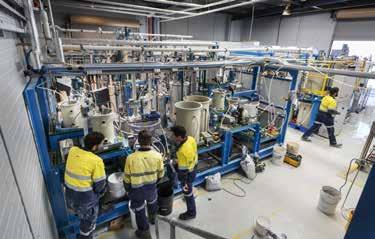

In 2018, when Lepidico, a lithium-mica processing company, was scouting for a location to set up its first chemical plant, Abu Dhabi seemed a good fit. The UAE capital has an abundant supply of sulphur, which is one of the key raw materials needed for Lepidico’s chemical plant. But besides this, what attracted the Australian company to UAE shores was the affordable supply of energy, with growing non-greenhouse gas emitting components, a conducive business environment, and the vision for net zero emissions in the next three decades.
Lepidico shares the UAE’s ambition for a clean future and aspires to support the country in achieving net zero emissions by 2050. It sees its first lithium chemical plant as being an enabler for development of downstream components of the broader electric vehicle battery supply chain and propel greater adoption of green vehicles on the road.

“I think there’s an enormous opportunity for the UAE. Lithium is a critical key component for electric vehicle manufacture. It’s essential for lithium-ion batteries. By bringing lithium chemical production to the UAE, we should enable downstream manufacturers of cathodes and then batteries to come to the UAE,” says Joe Walsh, Managing Director, Lepidico.
Lepidico is building a 57,000-square-metre zero waste facility in KEZAD, Abu Dhabi. So far, the company has completed the front end, engineering and design for the chemical plant,
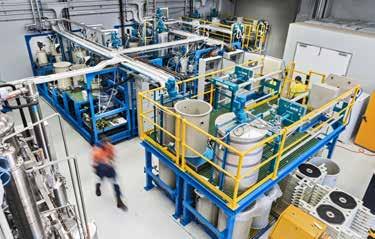
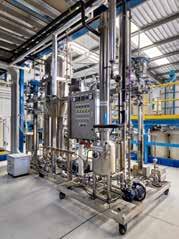
and over the next few months it plans to start the second stage.
The whole facility is expected to be up and running in about two years with production commencing around mid-2025.
Once operational, the chemical plant will produce around 5,000 tonnes of lithium hydroxide and five other products every year.
“Lepidico employs a number of proprietary process technologies to process lithium mica minerals, which collectively present a less conventional source of lithium chemicals. The primary mining and concentration of lithium mica will be in Namibia, which is where we are building the upstream part of our business. The lithium mica concentrate will then be exported to Abu Dhabi and be processed into lithium hydroxide and five other products, including caesium and rubidium.”
What differentiates this plant is the technology. Lepidico has
invested in developing process technologies that are less energy intensive compared with conventional ways of producing lithium hydroxide from the mineral spodumene. The company has run multiple pilot plants in Perth, Western Australia. The adoption of the technology in KEZAD will make it the world’s first commercial scale plant.
“We are arguably the most advanced company in the world with hydrometallurgical solutions for treating lithium mica




BASF, Quantafuel and DUBAL Holding sign FEED agreement
BASF becomes partner for front-end engineering design stage for a plant for chemical recycling of waste plastics in Dubai
BASF, Quantafuel and DUBAL Holding are moving to the front-end engineering and design (FEED) stage on the plant for chemical recycling of waste plastics in Dubai. After a sixmonth feasibility study where the main design parameters have been defined and the site and feedstock secured, the project is now entering the FEED stage with BASF as partner for the new phase of the project. A potential final investment decision (FID) is targeted for early 2023.
DUBAL Holding is the investment arm of the Dubai Government in the commodities and mining, power and energy, and industrial sectors. Quantafuel, a technology-based recycling company, and global chemical company BASF SE, have today signed an agreement to carry out a FEED for developing a Plastics-to-Liquid (PtL) processing plant in Dubai.

The PtL project will be a significant step towards a circular economy, converting low-quality, non-recyclable plastics into valuable products and by that helping Dubai achieve its objective of zero waste going to landfill by 2030.
The partners have agreed to cooperate and share the cost for the development of the plant based on the learnings from and optimisation of Quantafuel’s first full-scale commercial plant in Skive, Denmark. Italian engineering and construction major Saipem has been chosen as the FEED service provider. The
FEED for the development of the 80,000 tons per year plant will be done in 2022, with the potential final investment decision scheduled for early 2023.
Ahmad Hamad Bin Fahad, CEO of DUBAL Holding LLC, says: “This agreement is an important step towards a cooperation that will foster advancement of sustainable technology and help attain circular economy in the UAE. The basis of this agreement is to pursue investments that favour recycling and sustainability in the region. This project is in line with DUBAL Holding’s commitment to invest in promising projects, giving the Emirate a leading position globally in this emerging field.”
Chris Lach, Chief Commercial Officer of Quantafuel ASA says: “It is encouraging to see that
this project in Dubai has taken pole position in Quantafuel’s project portfolio. Based on our learnings in Skive and the completed feasibility study, we are pleased that this strong partnership has decided to move forward with FEED towards FID.”
Udo Huenger, Vice President and Head of Market Area Middle East, BASF FZE, says: “We are excited about the opportunity to be a partner in this FEED study for the plastics-toliquid plant in Dubai based on our know-how in the European ChemCyclingTM project. Supporting our technology partner Quantafuel and working with the visionary people at DUBAL Holding to drive Dubai’s vision of zero waste to landfill by 2030, brings us another step closer to a circular economy.”
minerals. Conventional processing for lithium involves a very energy-intensive roasting process at around 1,200 degrees Celsius that emits a significant amount of greenhouse gas. Our process operates at a maximum temperature of just 120 degrees Celsius. Furthermore, two-thirds of our greenhouse gas emissions are in the natural gas that we use to produce steam for the process,” notes Walsh.
The company is already mulling using green hydrogen instead

of natural gas to lower emissions further. “There are significant initiatives to bring commercial quantities of green hydrogen to KEZAD before 2030. The move should allow us to lower our greenhouse gas emissions dramatically and thereby produce some of the world’s lowest emission lithium chemicals. We see our 21st century technologies as supporting the challenge of meeting net zero emissions by 2050.”
Once the plant is fully operational, Lepidico will also bring a new


source of caesium and rubidium to the world market. “These two metals are on the US government’s list of 50 critical minerals. The availability of these chemical compounds in the UAE could result in furthering the development of technologies in the UAE in the application of those metals,” says Walsh.
Some of the by-products from this chemical plant will also help the UAE’s construction and agriculture industry in lowering carbon emissions. “One of the products, for instance, is a reactive silica, which can be used to partially reduce the use of cement in concrete to reduce its greenhouse gas footprint. We will also produce sulphate of potash, which is a fertiliser. At the moment, the UAE relies 100 per cent on imports to meet the needs of the agriculture sector.”
Lepidico is conscious of its role and impact on the environment.
“Leading environmental, social, and corporate governance credentials are vital in any new industrial development and Lepidico absolutely delivers in this regard. This first project in Abu Dhabi will demonstrate the commercial viability of our technologies, which in turn should allow us to develop a global market for lithium mica minerals and thereby enable further development within the UAE and elsewhere in the world. We have a sustainable growth business model: upstream in Namibia, midstream in the UAE and around the world with best practice social and environmental characteristics” says Walsh.
The Australian firm has invested $50 million in developing the technology. The company has earmarked $200 million for investment in Abu Dhabi, and around $65 million in Namibia.
6 UAE NET ZERO BY 2050 Monday, January 16, 2023
Lepidico shares the UAE’s ambition for a clean future and aspires to support the country in achieving net zero emissions by 2050
Dr Udo Huenger, Vice President and Head of BASF Market Area Middle East, Ahmad Hamad Bin Fahad, CEO of DUBAL Holding LLC, and Christian Lach, Chief Commercial Officer of Quantafuel ASA, at the signature ceremony of the agreement on the front-end engineering design for a chemical recycling plant in Dubai






































